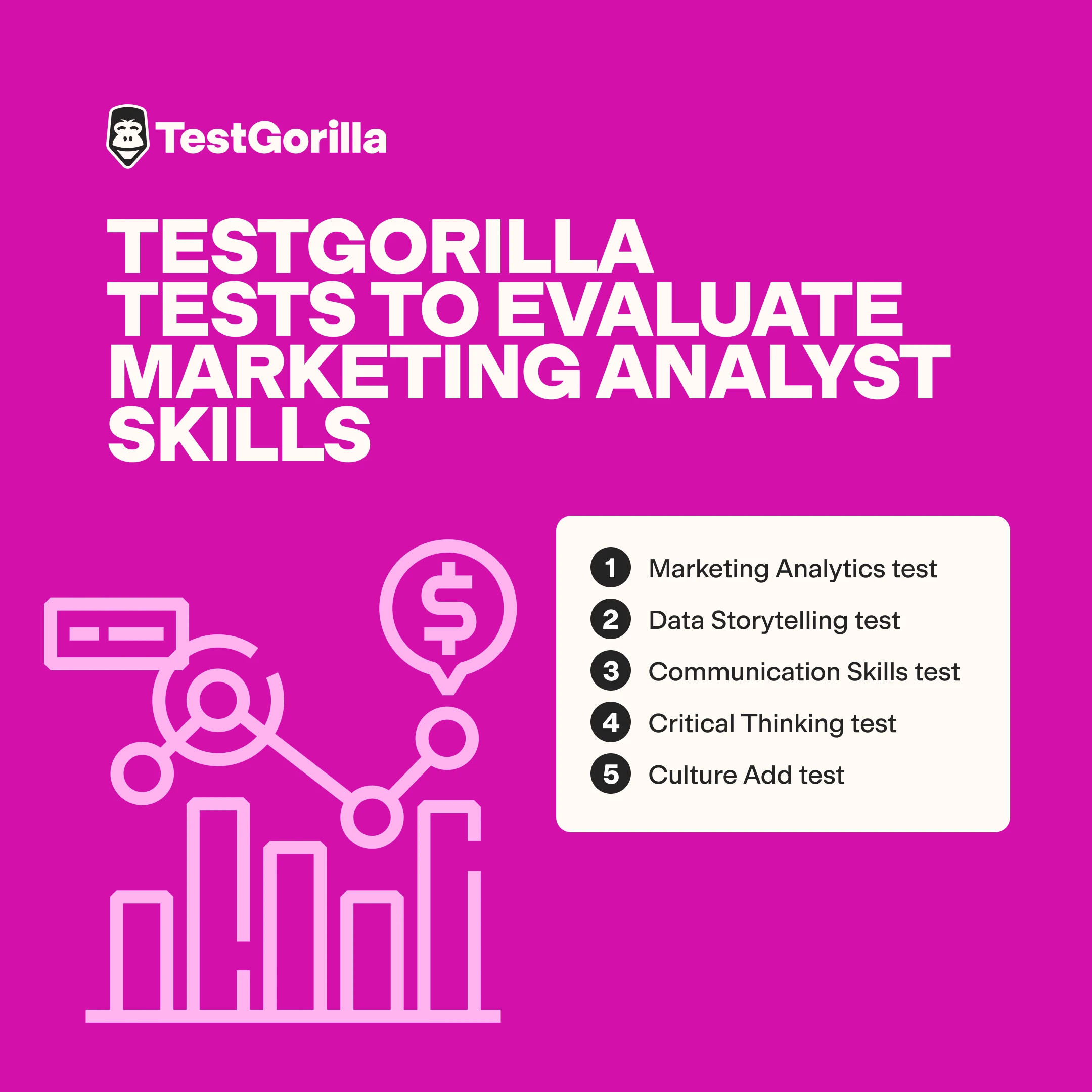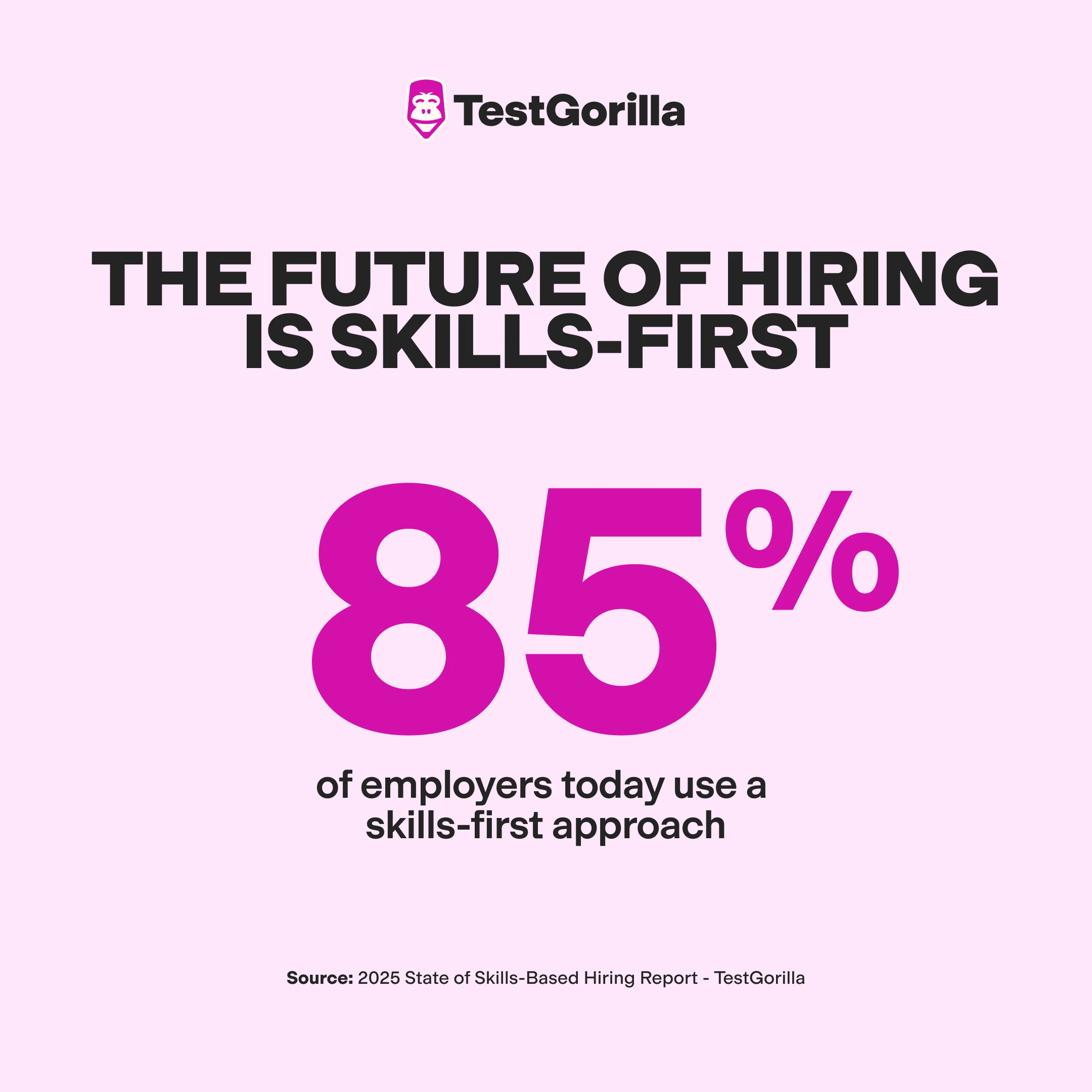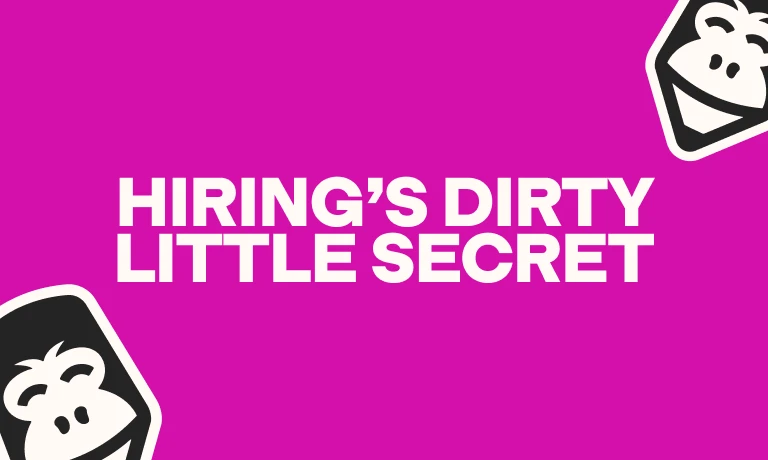Marketers know how to market themselves. They’ll dazzle you with data, captivate you with case studies, and say all the right things during the Q&A. Before you know it, you have a new hire.
But weeks in, the insights are thin, marketing efforts are lagging, and that “perfect fit” is costing you opportunities. You hate to admit it, but you’re stuck thinking, “Where are the skills that the resume and interview promised?”
This article will show you how to assess marketing analytics skills the right way, starting with TestGorilla’s Marketing Analytics test to build a process that spots real ability before the interview.
What marketing analytics skills are – and why traditional hiring methods can’t measure them
Marketing analytics skills blend data expertise, strategic thinking, and communication. They help marketers transform raw numbers from A/B testing, market research, customer data, Google Ads, social media platforms, and more into insights stakeholders can use. It’s a mix of logic and creativity that enables marketers to influence decisions and drive business impact.
As a result, these skills are incredibly difficult to spot through traditional hiring methods. Let’s break it down:
Resumes list tools and experience, but they don’t reveal how candidates think under pressure, use marketing strategies in real life, or explain complex data to non-technical teams.
Interviews often reward confidence, not competence. Sure, you may witness candidates speak smoothly about a past role, but you might not see how they interpret key performance indicators (KPIs) or make data-backed recommendations.
Interviews also can’t replicate the messy, unpredictable nature of real-world marketing challenges. They often favor theory over practical problem-solving and resilience.
Relying solely on resume screening and interviews can lower diversity in hiring, too. While culture add and personality traits do factor into hiring decisions, relying solely on “gut feeling” to measure them is risky. It can perpetuate bias, as we often gravitate towards people who mirror ourselves.
The expert way to assess marketing analytics skills
So, what’s the solution? A multi-measure approach.
When you combine objective, evidence-based assessments with realistic, role-specific evaluations, you gain a far more accurate view of a candidate’s capabilities than resumes or marketing analyst interviews alone can provide.
We spoke to two industry experts and tapped into TestGorilla’s own expertise to bring you a smarter, more effective process – one that uncovers true talent behind the numbers.
Test before you invest
Talent assessments are the best way to measure real-world, role-relevant skills, the kind you'd advertise in a marketing analyst job description. They remove guesswork, minimize bias, and reveal how a candidate would approach tasks they’ll face on the job.
TestGorilla offers hundreds of scientifically backed skills tests you can mix and match to create the perfect assessment for any of your open roles.
For marketing analysts and data-savvy marketers, we recommend starting with our Marketing Analytics test. It evaluates a candidate’s ability to interpret marketing data, identify trends, connect KPIs to strategic goals, and translate insights into measurable actions.
Then, you can add up to four more tests that assess role- and company-relevant skills and characteristics, from job-specific capabilities and personality traits to cognitive abilities and communication style. Consider these as pairings for your marketing analyst positions:
Data Storytelling test: Measures skills like data analysis, data visualization, storytelling, communication, and decision-making.
Communication Skills test: Tests clarity, conciseness, and adaptability when presenting complex ideas to various audiences.
Critical Thinking test: Assesses logical reasoning and problem-solving when facing ambiguous or incomplete data.
Culture Add test: Enables you to find candidates whose values and working style enhance – not just mesh well with – your company culture.
The future of hiring is skills-first According to our 2025 State of Skills-Based Hiring Report, 85% of employers today use a skills-first approach, up from 81% in 2024 and just 73% in 2023 – highlighting that this approach is the new standard. And these employers are seeing tangible results: - 80% are satisfied with their recent hires - 88% report faster time-to-hire compared to traditional methods - 89% say new hires perform better in their first six months - 91% report reduced mis-hires - 92% see stronger team performance overall |
|---|
Go deeper with real-world evaluations
After using talent assessments to confirm your candidates have the required marketing analytics skills, you need to see candidates apply those skills in context. Simulations are perfect for this, as they can mimic the imperfect conditions of an actual marketing analytics project.
We chatted with Mariana Delgado, Marketing Director at DesignRush, and Flynn Zaiger, CEO at Online Optimism, about running simulations when hiring for digital marketing analytics roles.
“A skilled marketing analyst should know how to use [Google Analytics 4] and SQL. However, they should also know how to do attribution modeling and comprehend multi-touch attribution. I like to give candidates test projects or case studies that are based on real life and ask them to acquire information from a number of sources and use that information to come up with strategic solutions,” Delgado shares.
“For example, I would ask folks who want to work with me to look over a false multi-channel campaign and tell me which channels aren't functioning and why. I would [then ask them to] use SQL queries and data from GA4 to learn more. This kind of assignment displays how [candidates] use their skills to think about and deal with difficult problems.”
Zaiger takes a similar approach:
“We give candidates a real (but anonymized) GA4 export from a client campaign that ran in early 2023. Then, we ask them to create a one-page summary of what worked, what didn't, and what they’d test next.
The magic isn’t in their specific recommendations – it’s in watching whether they notice our UTM parameters were inconsistent across channels. Technical skills matter, but I'm more interested in their ‘analytics translator’ abilities. Can they explain why a 2.3% conversion rate matters to a CEO who just wants to know if we’re making money? The best analysts I’ve hired could make a [...] data pull sound like a compelling story rather than a statistics lecture.”
The best insights on HR and recruitment, delivered to your inbox.
Biweekly updates. No spam. Unsubscribe any time.
Find your next great market analyst with TestGorilla
Hiring a standout marketing analyst requires more than resume screening and straightforward interviews. You need a way to confirm that your candidates have the skills required to thrive at your company.
Start with objective, skills-first talent assessments to find candidates who can interpret data, tell its story, and influence decisions. Then, run realistic simulations to see how they perform with the tools, quirks, and challenges your team faces every day.
TestGorilla can lend a hand with the first phase of the evaluation process. Our platform gives you everything you need to create and run bespoke assessments, compare candidates objectively, and see what talent can excel in your business.
Want to get started ASAP? Create your free TestGorilla account, or book a free demo, today.
Related posts
You've scrolled this far
Why not try TestGorilla for free, and see what happens when you put skills first.




















